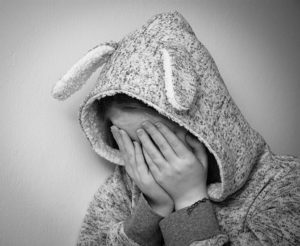 The other day my sensitive preschooler came home with a bruised and swollen lower lip. We asked him what happened.
The other day my sensitive preschooler came home with a bruised and swollen lower lip. We asked him what happened.
“Jimmy* kicked me. Jimmy sat on my head and kicked me.”
I immediately called school and asked them about it. Yes, they had all been playing under a table, and JJ got kicked in the face. They didn’t seem to think it was a big deal or anything seemed out of the ordinary for toddler behavior.
We asked JJ to tell us what happened.
“Jimmy is mean to me. He says mean things to me.”
What did he say to you?
“He said he was going to put pee pee and poo poo on me.”
Oh no, no, no. My sweet innocent little boy. You are far too young for this.
I already had some concerns about the behavior of this older kid. At drop-offs, I had seen him scream in my son’s face to make him cry. I’ve seen him push my son aggressively for no apparent reason. Of course, he is also just a child himself, trying to learn the right way to behave, but hearing this from my son made my mama bear instinct kick into major high gear.
It will break our mommy hearts at any age to see our kids be bullied, but it is especially difficult to bear for our tiny and innocent little ones who are having some of their first social experiences. Sadly, our young toddlers in preschool are not too young for this.
The sad and scary thing is that this is only going to get worse as they grow older.
I was about to teach my son some self-defense moves (e.g.. punch Jimmy right back in the face). But, before doing that, I poured a glass of wine, discussed it with my husband, and decided to email our experienced family members for advice.
My mother-in-law quickly and kindly explained to me, “The idea of punching Jimmy in the face will most likely end up with Jimmy retaliating and JJ losing his front teeth!!!! Plus we want to avoid transference; we don’t want to teach JJ that it’s OK to hit Jimmy plus Freddie and Fredrica!!!”
Okay, agreed. So what do we do? And what can we do now, at this tender age, to help prepare them for when it inevitably happens again in the future?
Here’s a to-do list I came up with and am currently implementing, based on a lot of advice from my experienced family members:
- Talk with your child. When your child comes home from school, ask him what happened today. Try to get him to talk and share with you. “What did you do at school today?” “Who did you play with?” “Did you get any owies?” Be calm and loving so he wants to share with you. Of course, don’t automatically believe everything he says without checking other sources, but listen carefully to him, and trust him.
- Talk to the teachers. What really happened? Kids make things up so we need to get the full story, as well as make sure the teachers are aware of the situation, paying attention, and taking action.
- Talk to other parents. Ask if other kids are saying similar things.
- Talk to the parents of the problem child. This is difficult, but it’s something to consider. Are they aware of this? Is something going on at home? What are they doing to help their child with this?
- Talk about bullying at home. I’m not sure how young is too young to start this conversation, but if bullying is happening, then it’s likely time to talk about it. Make sure your kid knows what bullying is. Talk about how important it is to be nice to other people.
- Teach your child words to stand up for themselves. Practice words they can use: “NO.” “Do not talk to me like that.”“Stop.” “No, I don’t like that.” “STOP! LEAVE ME ALONE.” “Friends don’t talk to each other like that.” Teach them to put their hands up protectively, run to the teacher and tell them what happened.
- Make sure your child knows that being bullied is NOT his fault. He has done nothing wrong and in no way ever deserves to be treated that way.
- Role-play. Practice it at home. How this plays out depends on the age, but what we’ve been doing is this: I will ask my son, “What will you say if someone is mean to you?” Then, he practices putting his hand out, saying, “STOP,” and running to the teacher.
- Teach your child to help protect other kids who are being bullied. Teach him to look out for kids who are sad, to be nice to them, play with them and help protect them.
- Help your child know who his friends are. Review who his friends are at school, who is nice to him and how important it is that he be nice to others.
This is our initial plan for dealing with this, but please share any other ideas or tips you have. For more on bullying, here’s a great resource.
*Real name of little boy has been changed.

















